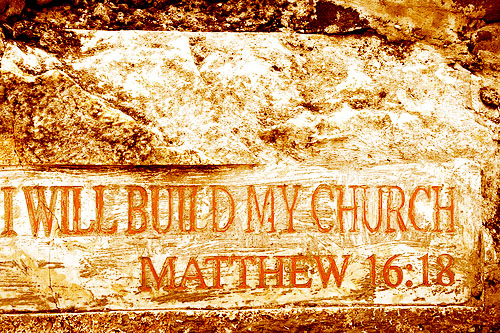The Greek word for “church” is ekklesia. We find it in the New Testament, but we also find in the Old Testament — in the Septuagint (aka, LXX), which is an ancient Jewish translation of the Old Testament into Greek. There, it refers to the assembly, or congregation, of Israel — God’s chosen people gathered before Him. It occurs at least 77 times, including these, where it refers to:
- The “assembly of God” (Nehemiah 13:1)
- The “great assembly” where God is praised and the good news is proclaimed (Psalm 35:18; 40:9)
- The “congregations” where God is blessed (Psalm 26:12; 68:26)
- The “assembly of the saints” (Psalm 89:5, 149:1)
- The “assembly of the people” where God is exalted (Psalm 107:32)
- The “assembly of the LORD” (Micah 2:5)
God has only ever had one people, and it is the same people in both the Old and New Testaments. In the Old Testament, they are referred to as His own “chosen” people (e.g., Deuteronomy 14:2). In the New Testament, “elect” is the word that is used, which means the same things as “chosen.” All who believe on Jesus the Messiah, whether Jews or Gentiles, are referred to as “elect” (e.g., 1 Peter 1:1-2), “chosen” (e.g., 1 Peter 2:9), and God’s “own special people” (Titus 2:14).
Gentiles, or pagans, who come to the Lord Jesus do not become a new and separate people of God. They are, rather, “grafted” into the one people God chose from the beginning. Paul speaks of this in Romans 11, where he explains that unbelieving Jews, though they be the “natural” branches, have been broken off from the “olive tree” (Israel) because of their unbelief (v. 17, 21). However, when they return and receive Jesus the Messiah, they will be grafted back in (v. 23). Gentiles who believe in Jesus, on the other hand, though they be “wild” branches, are grafted into the “olive tree” of God’s chosen people (v. 17). And because they are grafted in, it can be truly said of them that they are now part of the olive tree, too — made one with God’s chosen people. (See Grafted Into the Chosen People)
In the New Testament, both Jews and Gentiles who believe on Jesus the Messiah are called the “elect” or “chosen” and are referred to as the Church. Does this mean that the Church has replaced Israel as the chosen people? NO, NOT AT ALL! Israel is still the chosen people, and Jews who have received the Messiah remain in it. But now Gentiles who believe on Messiah are part of it, too, grafted in through faith. The chosen people of the Old Testament has been broadened out to include all who believe on Jesus the Messiah — even the pagans. That is why Paul says in the beginning of Romans that the gospel is “the power of God to salvation to everyone who believes, for the Jew first and also for the Greek [Gentile]” (Romans 1:16).
What, then, of the modern nation of Israel? Is the modern political state the same thing as the chosen people of the Old and New Testaments? No, not necessarily. Those in the modern nation of Israel who believe on Jesus the Messiah belong to the chosen people. Those who do not believe on Him do not, because of unbelief. The chosen people is no longer limited to ethnic Jews but now includes men and women of all the nations who believe on the Messiah.
The New Testament Church does not replace Israel as the chosen people, nor is it some sort of parenthesis in God’s plan concerning Israel. Rather, the Church is how Paul speaks of the reality of Israel as God’s chosen people. God has never changed His mind. He has never forgotten His people, or His promise to Abraham, Isaac and Jacob. It has always been His purpose to bless all the families of the world through Abraham and to gather in all the nations as His chosen people.





